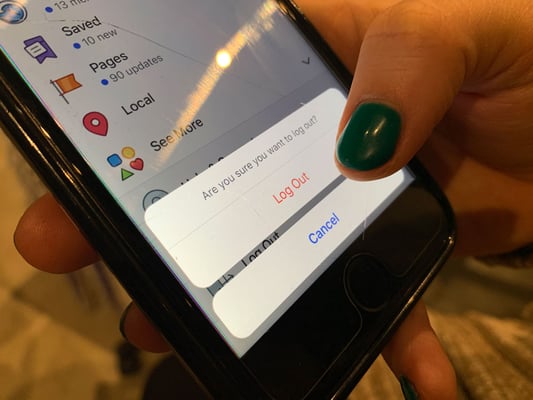Subscribe now and get the latest podcast releases delivered straight to your inbox.
NAACP's #LogOutFacebook Protest Uncovers A Whole New Danger of Data Misuse

By Dia Vavruska
Dec 19, 2018

Facebook continues to bear the brunt of public criticism in its seemingly never-ending privacy saga.
Very much under the microscope, investigations and implications surrounding the social network’s misuse of user data and distribution of political content has now spilled over into a deeper concern of civil rights.
Yesterday, the NAACP announced the #LogOutFacebook digital protest and a call to Congress to further investigate Facebook in response to two recently published bipartisan reports commissioned by the Senate Intelligence Committee as part of the Russian influence campaign investigation.
Here are the details and why it matters for users, including marketers...
What is #LogOutFacebook?
Today marks Day 2 of #LogOutFacebook — a week-long, civil rights-fueled boycott of Facebook and Instagram led by the NAACP in response to recent reports that individual users and communities of color were targeted by the Russian influence campaign in the 2016 U.S. presidential elections.
You can also read the official NAACP press release for additional details.
.@NAACP has expressed concern about the privacy mishaps & hate speech incidents @facebook has allowed. That’s why we‘re leading a weeklong logout in the hope that they’ll do better to protect & support communities of color online. Join us. #LogOutFacebook & Instagram on 12/18. pic.twitter.com/qrs3I9U1K9
— Derrick Johnson (@DerrickNAACP) December 17, 2018
Facebook Facing Major Civil Rights Criticism
The New York Times shared “The Russian influence campaign...made an extraordinary effort to target African-Americans… [using]an array of tactics to try to suppress turnout among Democratic voters and unleashed a blizzard of activity on Instagram that rivaled or exceeded its posts on Facebook.”
The New Knowlege report, also states that while “other distinct ethnic and religious groups were the focus of one or two Facebook Pages or Instagram accounts, the black community was targeted extensively with dozens.”
(You can also read the University of Oxford report here.)
But that’s not all.
While racially charged and targeted propaganda, voter suppression, and hate content are at the forefront of the NAACP protest, the organization also noted expressing concern for years regarding Facebook’s (along with the entire Silicon Valley tech community) lack of diversity in the workforce.
As summarized by The Verge, “Despite improvements, however, Facebook is still a company that is predominantly male and mostly white and Asian — a fact that seems unlikely to drastically change in the near future. And after five years of Facebook releasing these reports, more than two-thirds of senior company leadership are still white men.”
You can also check out Facebook’s Fifth Annual Diversity Report here.
Facebook’s Response & 2019 Resolution
Earlier this year, Facebook brought on civil rights champion and former ACLU chief, Laura Murphy, to conduct a six-month Civil Rights Audit and provide the organization with clear direction on how to resolve these issues.
According to the audit update published Tuesday, “The purpose of the audit is to ensure Facebook makes real and lasting progress in the area of civil rights and civil liberties.”
And in regards to 2019 initiatives, “The first two areas of focus for 2019 are Content Moderation and developing a Civil Rights Accountability Infrastructure, to build upon the work [Facebook] have begun.”
What this means is that the social network will:
-
Continue to focus on, and enforce, the moderation and censorship of “harmful and potentially discriminating content from the platform.”
-
Work toward an improved infrastructure that ensures “civil rights issues are considered on ’the front end’ when Facebook develops new products, features, and policies.”
Facebook COO Sheryl Sandberg also weighed in yesterday regarding the audit, reinforcing the organization's position and commitment to making right by its users.
Why It Matters to Facebook Users & Social Community
Over the past few years, we’ve witnessed dozens of high-profile data breaches — from social networks to major financial institutions and retailers — and have learned that data security is not a guarantee and can, unfortunately, leave us vulnerable to malicious outside parties.
But why is this latest development with Facebook different?
Well, while we’ve covered the issue of data privacy and security from a hacking and identity theft perspective, these recent findings bring forward an entirely new lesson in the unforeseen implications of data misuse — one of social significance that cannot be ignored.
The findings from these reports and the response from the civil rights community will hopefully fuel constructive conversations and reactions from companies to better protect users' data and eradicate the possibility of racial targeting and discrimination via social content.
Regardless of your political affiliation or ethnicity, we encourage users and marketers alike to stay informed on how social networks like Facebook are managing and protecting your information, as well as how they respond in the aftermath of a breach.


Order Your Copy of Marcus Sheridan's New Book — Endless Customers!